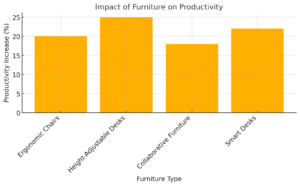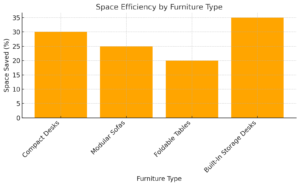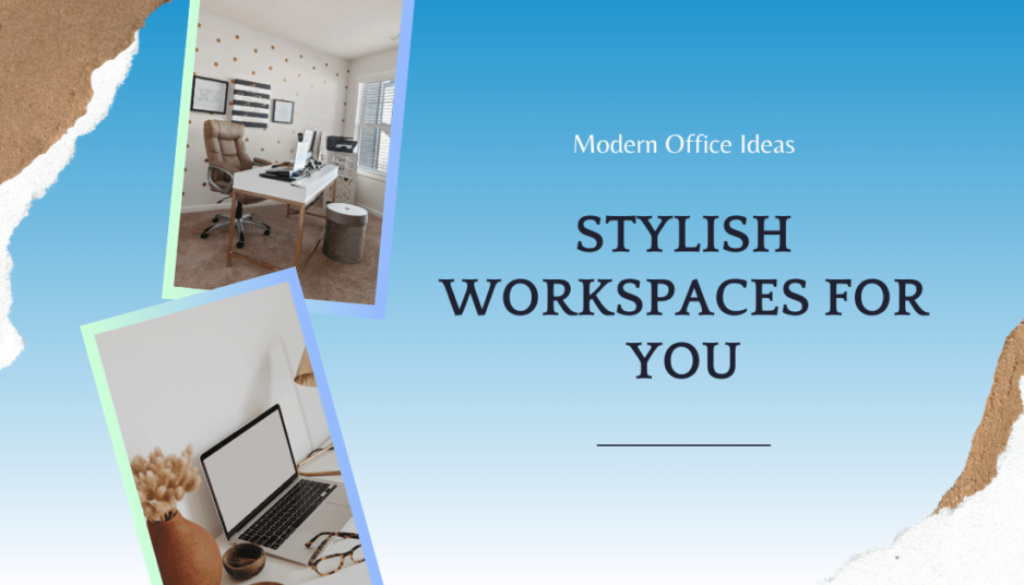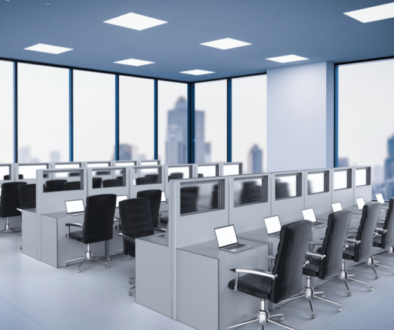Creating Functional and Stylish Workspaces for Modern Offices
Creating Functional and Stylish Workspaces for Modern Offices – Designing a workspace that seamlessly blends comfort and efficiency starts with choosing the right furniture. Investing in high-quality furnishings tailored to specific needs can transform your office into a productive, inspiring, and aesthetically pleasing environment.
The Role of Furniture in Office Environments
Furniture forms the cornerstone of any professional workspace. It not only provides essential functionality but also reflects the values and culture of a business. In dynamic global hubs like Dubai, where innovation meets luxury, the demand for office furniture that balances practicality and aesthetics is higher than ever. From fostering employee productivity to leaving a lasting impression on clients, the importance of furniture in creating an efficient office environment cannot be overstated.
Why the Right Furniture Matters for Your Office
Enhancing Employee Comfort
Ergonomic furniture is a cornerstone of a healthy and productive workplace. Employees spend a significant portion of their day sitting at their desks, making it essential to prioritize their comfort and well-being. Ergonomic chairs, for example, are designed to provide proper lumbar support, which helps maintain the natural curve of the spine. This reduces strain on the back and minimizes the risk of long-term health issues such as chronic back pain and posture-related problems.
Height-adjustable desks are another essential element. These desks allow employees to alternate between sitting and standing positions, improving blood circulation, reducing fatigue, and preventing issues like neck and shoulder pain. Studies have shown that alternating between sitting and standing can boost energy levels and enhance focus, improving productivity.
Moreover, properly cushioned seats and armrests provide additional support, ensuring that employees remain comfortable throughout long workdays. When employees feel physically comfortable, they are less likely to experience distractions and more likely to stay engaged with their tasks. This results in higher levels of creativity, efficiency, and job satisfaction, contributing to a healthier and happier workplace culture.
Maximizing Space Efficiency
Space is often a premium in modern office environments, especially in urban areas like Dubai, where real estate can be costly. Efficiently utilizing the available space is critical to creating a functional and organized workspace.
Compact and multifunctional furniture is an excellent solution for optimizing space. For instance, desks with built-in storage compartments or shelves provide ample room for organizing office supplies without additional furniture. Foldable or stackable furniture, such as chairs and tables, can be easily stored away when not used, freeing up space for other activities like meetings or collaborative projects.
Open-plan offices can also benefit from modular furniture designed to be easily reconfigured. Modular sofas, movable partitions, and adjustable workstations allow companies to adapt their office layouts based on changing needs. This flexibility is particularly valuable for startups and small businesses as they grow or downsize their teams.
Furthermore, space-efficient furniture helps maintain an uncluttered environment, positively impacting employee focus and reducing stress. A well-organized office not only looks more professional but also enhances the overall functionality of the workspace.
Aesthetics Reflecting Brand Identity
The furniture in your office is more than just functional—it visually represents your company’s values, culture, and professionalism. The aesthetics of your office space can significantly influence how clients, partners, and potential employees perceive your business.
Minimalistic furniture with clean lines and modern designs communicates innovation, efficiency, and forward-thinking. This style particularly appeals to tech startups and creative industries, where a contemporary look aligns with the company’s image. On the other hand, luxurious wooden furniture with intricate detailing conveys a sense of tradition, reliability, and sophistication, making it ideal for law firms, financial institutions, and other businesses that value a classic aesthetic.
Color schemes and materials also play a role in reflecting your brand identity. For example, incorporating your company’s brand colors into furniture accents or upholstery can create a cohesive and recognizable look. Additionally, using eco-friendly materials, such as reclaimed wood or bamboo, demonstrates a commitment to sustainability and resonates with environmentally conscious clients and employees.
Ultimately, investing in aesthetically pleasing furniture enhances the overall ambiance of your workspace. It creates a welcoming atmosphere that makes employees feel proud to work there and leaves a lasting impression on visitors. A well-furnished office speaks volumes about your attention to detail and commitment to maintaining a professional and inspiring environment.
Key Features to Look for When Choosing Furniture
1. Durability for Longevity
The durability of office furniture directly impacts its value and usability over time. High-quality materials like hardwood, stainless steel, aluminum, and tempered glass are ideal for ensuring longevity. These materials can withstand daily wear and tear, maintaining their functionality and aesthetic appeal for years. Additionally, opting for scratch-resistant finishes and waterproof surfaces can enhance furniture lifespan, especially in high-traffic areas like conference rooms or reception spaces.
Investing in furniture with manufacturer warranties and maintenance support is another smart choice. Warranties provide peace of mind, ensuring that any defects or damages can be addressed without incurring significant costs.
2. Adaptability to Evolving Needs
Modern work environments are dynamic, and businesses must adapt to changes such as team expansion, remote work setups, or reconfigured office layouts. Modular and flexible furniture is an excellent solution for such scenarios.
For example:
- Height-adjustable desks cater to employees who prefer alternating between sitting and standing.
- Reconfigurable workstations allow companies to switch from individual desks to collaborative setups as needed.
- Movable partitions enable businesses to create private spaces or open layouts depending on specific requirements.
Furniture that can evolve with your business reduces the need for frequent replacements, saving costs in the long run.
3. Comfort for Long Work Hours
Comfort is a critical consideration, especially in environments where employees spend extended hours at their desks. Key features to prioritize include:
- Ergonomic Design: Chairs with lumbar support, adjustable armrests, and padded seats promote proper posture and minimize strain.
- Breathable Materials: Mesh-backed chairs improve ventilation and prevent discomfort caused by prolonged sitting.
- Spacious Desks: Large work surfaces with built-in cable management systems enhance comfort and organization.
Comfortable furniture not only boosts employee productivity but also reduces absenteeism caused by physical discomfort or health issues.
4. Aesthetic Appeal
The visual appeal of office furniture plays a vital role in creating a professional and inspiring workspace. Look for designs that align with your brand identity while maintaining a cohesive and modern aesthetic. For instance:
- Sleek, minimalist furniture suits tech startups or creative agencies.
- Classic wooden furniture fits law firms or traditional corporate offices.
- Brightly colored or unique designs work well in industries like advertising or media.
Integrating furniture with bold designs or your company’s color scheme creates a welcoming and recognizable workspace.
5. Sustainability and Eco-Friendliness
With growing emphasis on sustainability, eco-friendly furniture has become a popular choice. Opt for pieces made from recycled or renewable materials like bamboo, reclaimed wood, or recycled plastic. Certifications such as FSC (Forest Stewardship Council) or Greenguard indicate environmentally responsible manufacturing practices.
Sustainable furniture is not only better for the planet but also resonates with environmentally conscious clients and employees, enhancing your brand’s reputation.
6. Functionality and Multi-Purpose Features
Furniture that offers multiple functionalities can maximize office efficiency. Examples include:
- Desks with built-in storage compartments to keep essentials organized.
- Foldable tables that can be used for meetings and easily stored afterward.
- Sofas with hidden storage for extra seating and file organization.
These features enhance convenience while reducing clutter in the office.
7. Technology Integration
Modern offices require furniture that accommodates technology. Features to look for include:
- Desks with built-in charging ports for phones, laptops, and other devices.
- Cable management systems to minimize clutter and prevent tangled wires.
- Standing desks with digital controls for precise height adjustments.
Technology-integrated furniture is especially useful in industries where innovation and efficiency are key.
8. Ease of Maintenance
Furniture that is easy to clean and maintain ensures long-term usability and aesthetics. Materials like laminate, treated wood, or leatherette are easy to wipe down and resistant to stains. In contrast, furniture with removable covers or modular components allows for quick repairs or replacements.
9. Customization Options
Every office has unique needs and preferences. Opting for furniture with customizable options, such as color, size, or material, ensures that it fits seamlessly into your workspace. Customization also allows businesses to incorporate branding elements, such as company logos or specific color schemes, into their office design.
10. Budget-Friendly Options
While quality should never be compromised, it is possible to find furniture that offers value for money. Compare prices from multiple vendors, look for bulk discounts, and explore refurbished or high-quality second-hand furniture options. Many suppliers also offer flexible payment plans for businesses on a budget.
Furniture Trends in Dubai’s Business Sector
Eco-Friendly Furniture
As global sustainability goals gain traction, eco-friendly furniture has emerged as a dominant trend in Dubai’s business sector. Companies are prioritizing sustainable practices, and furniture made from recycled wood, bamboo, biodegradable plastics, and other renewable resources is in high demand.
Eco-friendly furniture doesn’t just reduce environmental impact; it also offers unique, stylish designs that appeal to modern businesses. Options such as desks with reclaimed wood tops, chairs crafted from recycled plastic, and modular systems made from bamboo are both functional and aesthetically pleasing. Moreover, businesses adopting sustainable furniture send a strong message to clients and employees about their commitment to environmental responsibility, aligning with Dubai’s broader push toward a greener future.
Smart Furniture for the Modern Office
Dubai’s reputation as a global innovator is reflected in the growing popularity of smart furniture. These technology-integrated pieces enhance both convenience and efficiency, catering to the needs of tech-savvy professionals.
Key examples include:
- Desks with built-in charging ports: Allow employees to charge their devices without clutter.
- Adjustable lighting systems: Enhance focus and reduce eye strain, especially in workspaces with varying lighting needs.
- Cable management desks: Prevent cable clutter, maintaining a clean and professional appearance.
- Height-adjustable smart desks: Operated by digital controls, these desks offer personalized settings, promoting health and productivity.
Smart furniture transforms traditional workspaces into tech-forward environments, fostering innovation and productivity.
Collaborative Furniture for Open Spaces
With open-plan offices becoming increasingly popular in Dubai, businesses are adopting furniture designed for collaboration and flexibility. Collaborative furniture creates spaces that encourage teamwork while maintaining functionality for individual tasks.
Some examples include:
- Modular sofas and tables: These can be rearranged easily for brainstorming sessions or informal meetings.
- Long communal desks: Ideal for group projects, these desks foster interaction and idea sharing.
- Movable partitions: Provide temporary privacy or separation when needed, allowing businesses to adjust layouts effortlessly.
By fostering interaction and teamwork, collaborative furniture helps create a dynamic and adaptive work environment, crucial for industries where communication and innovation are key.
Tips for Selecting the Perfect Furniture
- Assess Your Needs:
Begin by evaluating your office’s specific requirements. Consider factors such as the number of employees, the type of tasks performed, and the layout of your workspace. For example, open-plan offices may benefit from modular furniture, while traditional setups might require more structured pieces like executive desks and chairs. - Set a Budget:
High-quality furniture is an investment that pays off in durability, employee comfort, and enhanced aesthetics. Create a budget that balances cost and value. Don’t hesitate to explore mid-range options or discounts from reputable suppliers without compromising on essentials like comfort and functionality. - Prioritize Functionality:
Choose furniture that improves productivity and caters to daily operations. Ergonomic chairs, height-adjustable desks, and tables with built-in storage are excellent examples of functional furniture that supports efficiency. Additionally, multipurpose pieces like foldable tables or desks with charging stations can save space and add convenience. - Consider Aesthetics:
Your furniture should align with your company’s brand identity and create a cohesive look across the workspace. Whether it’s sleek, minimalist designs for modern offices or luxurious wooden furniture for a more traditional look, your furniture’s aesthetics significantly impact both employees and visitors. - Work with Reputable Suppliers:
Partnering with reliable vendors ensures high-quality furniture with customization options and warranties. Many suppliers in Dubai offer tailored solutions to meet specific business needs, such as custom branding or unique designs. Working with trusted suppliers also provides access to long-term maintenance and support, protecting your investment.
The Impact of Furniture on Employee Productivity
Comfort Equals Efficiency
When employees have access to comfortable furniture, they are less likely to experience distractions caused by physical discomfort. Ergonomic chairs can reduce absenteeism caused by back and neck pain, enabling teams to maintain higher productivity levels.
Organized Spaces Encourage Focus
Furniture incorporating storage solutions helps reduce clutter, creating a more organized and focused environment. Desks with drawers, filing cabinets, and collaborative tables with hidden compartments keep workspaces tidy and efficient.
Personalization for Better Engagement
Allowing employees to customize their workstations with adjustable desks and chairs fosters a sense of ownership and satisfaction, further boosting engagement and morale.
Impact of Furniture on Productivity

Space Efficiency by Furniture Type

Key Takeaways
- Ergonomic and functional furniture improves productivity and employee satisfaction.
- Sustainable and smart furniture options are becoming increasingly popular.
- Investing in high-quality furniture reflects your company’s values and professionalism.
Related Posts:
- 2025’s Most Stylish and Functional Office Furniture in Dubai
- 2024 Office Furniture Trends for Innovative and Creative Workspaces
- How Long Should Your Furniture Last? Tips and Insights
- Affordable and Flexible Office Furniture Solutions for Small Spaces in 2025
- The Modern Concept of Offices Today: A New Approach
Conclusion: Functional and Stylish Workspaces
Investing in the right furniture for your office is crucial for fostering productivity, comfort, and professionalism. From ergonomic designs to eco-friendly materials, the right choices can transform your workspace into a haven of efficiency and style. Take the first step towards creating a workspace that reflects your vision and inspires your team.
FAQs
1. What are the essential pieces of furniture for an office setup?
The essential pieces include ergonomic chairs, adjustable desks, filing cabinets, conference tables, storage solutions, and reception desks. These items ensure comfort, functionality, and a professional environment.
2. How does ergonomic furniture improve productivity?
Ergonomic furniture promotes better posture, reduces physical strain, and minimizes workplace injuries. This results in fewer distractions, improved focus, and enhanced overall productivity.
3. What materials are best for office furniture in Dubai’s climate?
Materials like metal, tempered glass, and treated wood are durable and suitable for Dubai’s hot and humid climate. Additionally, leather and high-quality fabric are great choices for office chairs, offering comfort and resilience.
4. How can I maximize space in a small office?
Modular furniture, compact desks, and wall-mounted storage solutions can help optimize space in smaller offices. Multi-functional furniture, such as desks with built-in storage, also adds efficiency.
Source Links:



